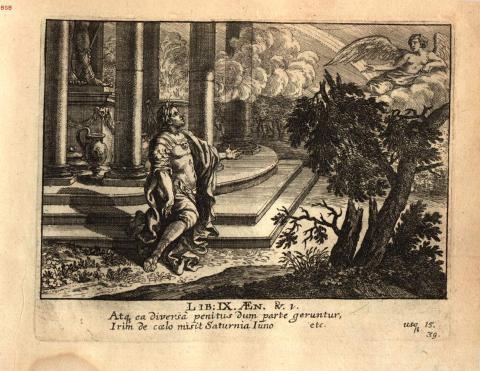CORE VOCABULARY
penitus: adv. (cf. penes), inwardly, far within, deep, deeply, 1.200; wholly, entirely, 6.737; afar, 11.623; far away, 1.512.
Īris, idis, f., acc. Īrim: Iris, the goddess of the rainbow, daughter of Thaumas and Electra, and messenger of the gods above, 4.694, et al.
Sāturnius, a, um: adj. (Sāturnus), belonging to Saturn; Saturnian; sprung from Saturn; Saturnian, 4.372; subst., Sāturnius, iī, m., the son of Saturn, 5.799; Sāturnia, ae, f., 1. Daughter of Saturn, Juno, 1.23; 2. The city of Saturnia, built by Saturn on the Capitoline hill, 8.358.
Iūnō, ōnis, f.: Juno, the Sabine and Roman name for the wife and sister of Jupiter, daughter of Saturn, 1.4, et al.; Iūnō īnferna, the Juno of the lower world, Proserpine, 6.138.
Turnus, ī, m.: the chief of the Rutulians, 7.56, et al.
lūcus, ī, m.: a consecrated wood; sacred grove, 6.259, et al.; in general, a grove, wood, forest.
Pīlumnus, ī, m.: a Latin deity, ancestor of Turnus, 10.619, et al.
sacrātus, a, um: holy, 3.371. (sacrō)
vallēs, is, f.: a valley, dell, dale, ravine, vale, 1.186, et al.
roseus, a, um: adj. (rosa), pertaining to roses; rose-colored; rosy, 1.402.
Thaumantias, adis, f.: the daughter of Thaumas, Iris, 9.5. (Thaumas)
volvō, volvī, volūtus, 3, a.: to roll, 1.86; roll along or down, 1.101; roll or cast up, 3.206; toss, hurl, 12.906; roll over, roll in the dust, 12.329; cast, hurl down, 1.116; 9.512; roll, wheel, 1.163; of books, open, unroll, 1.262; of the Fates, fix the circle of events, decree, ordain, dispose, 1.22; 3.376; of the mind, revolve, meditate, reflect upon, 1.305; pass, continue, live through, experience, endure, suffer, 1.9; rotam volvere, to complete a cycle, period; (pass.), volvī, roll over, roll, 10.590; turn or wind about, 7.350; to be shed, to flow, 4.449; roll on, revolve, 1.269.
ēn: (interj.), lo! behold! with nom., 1.461; in indignation, 4.597.
ultrō: (adv.), to the farther side; furthermore, over and above, moreover, 2.145, et al.; even, 9.127; beyond the limit of necessity; uncompelled, unasked, unimpelled; apart from all external influences, of one's self, of one's own accord or motion, voluntarily, willingly; unprompted by any words on another's part, first, 2.372; 4.304; unaddressed, 10.606; promptly, 10.282; impetuously, 12.3. (cf. ulterior)
Aenēās, ae, m.: 1. A Trojan chief, son of Venus and Anchises, and hero of the Aeneid, 1.92. 2. Aenēās Silvius, one of the Alban kings, 6.769.
scēptrum, ī, n.: a royal staff; scepter, 1.653; freq.; (meton.), rule, sway, power, royal court, realm, 9.9; 1.253; authority, 11.238.
Palātīnus, a, um: adj. (Palātium), belonging to, dwelling on the Palatine hill, 9.9.
Euander (-drus, 8.100; Ēvander, -drus), drī, m.: Evander, an Arcadian prince, son of Carmentis, and king of Pallanteum on the Tiber, 8.52.
nec or neque: (adv. and conj.), and not; neither, nor, 1.643, et al.; in prohibition, 3.394, et al.; neque (nec) — neque (nec), neither — nor, 5.21, et al.; nec — et, or -que, may be rendered neither — nor, 12.801; 2.534; nec nōn, and also, nor less, 6.183; nec nōn et, and also, 1.707.
Corythus, ī, m.: an ancient city of Etruria, later, and now Cortona, 3.170.
penetrō, āvī, ātus, 1, a. and n.: to penetrate, reach, 1.243; attain to, go as far as, penetrate to, 7.207. (rel. to penitus)
Lӯdī, ōrum, m.: the people of Lydia; the Lydians; Etruscans, descendants of the Lydians, 9.11. (from the adj. Lӯdus, a, um, used as subst.)
manus, ūs, f.: the hand, 1.487; freq.; (meton.), action, movement of the hand; work, art, handiwork, 3.486; prowess, heroic deed, action, 2.434; force, violence, 2.645; a collection of persons; a band, crew, troop; an army, 2.29; forces, 5.623; multitude, 6.660; pl., manūs, workmen, 11.329; dare manūs, to yield, 11.558; extrēma manus, the finishing hand or touch, 7.572.
armō, āvī, ātus, 1, a.: to equip with arms; arm, equip, 2.395, et al.; fit out, make ready, prepare, 4.299; (fig.), imbue, charge, 9.773; p., armātus, a, um, armed, charged, 12.857; subst., armātī, ōrum, m., armed men, warriors, 2.485. (arma)
agrestis, e: adj. (ager), pertaining to the fields or country; country-, rustic, rural, 3.34; wild, 7.111; subst., agrestis, is, m., a rustic, 7.504; husbandman.
tempus, oris, n.: 1. Time in general, a period, time, 1.278; interval or space of time, 4.433; crisis, circumstance, juncture, 7.37; season, fitting time, opportunity, proper moment, 4.294; ex longō (tempore), in or for a long time, 9.64. 2. The temple of the forehead, 9.418; commonly pl., 2.684; of animals, 12.173.
arripiō, uī, reptus, 3, a.: to seize for one’s self; seize, 9.561; lay hold upon; surprise, 9.13; (fig.), hasten to, gain, 3.477. (ad and rapiō)
pār, paris: (adj.), equal, 1.705; like, 2.794; equal, well-poised, steady, 4.252; side by side, 5.580; well-matched, 5.114.
āla, ae, f.: a wing, 1.301; the feather of an arrow, 9.578; the wing of an army; cavalry, 11.730; troop, battalion, 11.604; horsemen, mounted huntsmen, 4.121.
secō, secuī, sectus, 1, a.: to cut, freq.; cut off, 4.704; engrave, carve, 3.464; cut through, cleave, 5.218, et al.; of the channel of a river, 8.63; sail through, pass, 8.96; speed, 6.899; shape out mentally, form, 10.107.
nūbēs, is, f.: a cloud, 1.516, et al.; storm, 10.809; the air, 12.856; (fig.), flock, multitude, 7.705.
arcus, ūs, m.: a bow, 5.500, et al.; the rainbow, 5.88.
adgnoscō, nōvī, nitus, 3, a.: to recognize, 1.470.
duplex, icis: adj. (duo and plicō), twofold, double, 1.655; lying over each other, lapping, 9.707; both, 1.93; twin, 12.198.
palma, ae, f.: the palm of the hand, 8.69; the hand, 1.93; palm branch, 5.111; a palm branch or wreath as the symbol of victory; reward, prize, 5.349; victory; a victor, 5.339.
atque, or ac: (conj.), and in addition, or and besides; and, as well, and indeed, and, 1.575; freq.; even, 2.626; in comparisons, as, 4.90; than, 3.561.
repēns, entis: (adv.), suddenly, unexpectedly, 1.594.
discēdō, cessī, cessus, 3, n.: to go apart or away, retire, withdraw, depart, 2.644; open, 9.20.
pālor, ātus sum, 1, dep. n.: to wander about, wander, 9.21; go astray; straggle, retreat, flee, 5.265.
polus, ī, m.: the terminating point of an axis; the celestial pole; (meton.), the heavens, sky, 1.90; air, 1.398.
ōmen, inis, n.: a prognostic, token, sign, omen, 2.182; (meton.), evil, 2.190; auspicious beginning, 7.174; pl., auspices; rites, 1.346; in ōmen, as or for a warning, 12.854.
effor, fātus sum, 1, dep. a. and n.: to speak forth; speak, say, 6.560. (ex and for)
prōcēdō, cessī, cessus, 3, n.: to go or come forth or forward; advance, proceed, go on, 2.760; move, 4.587; elapse, pass by, 3.356; continue, 5.461.
hauriō, hausī, haustus, 4, a.: to draw any fluid, 9.23; drink; drain, 1.738; draw blood with a weapon; devour, slay, 2.600; pierce, 10.314; take in with the eyes or ears; receive, 12.26; perceive, see, 4.661; hear, 4.359; strain, thrill, 5.137; suffer, 4.383; conceive, 10.648.
gurges, itis, m.: a whirlpool, gulf, 3.421; flood, 2.497; wave, billow, 3.564; rolling, raging sea, abyss, 1.118; sea, ocean, 7.704.
lympha, ae, f.: clear spring water; water, 4.635, et al.; pl., for sing., 1.701, et al.
multa, ōrum, n.: (adv.), much, greatly, exceedingly, 4.390, et al. (compar.), plūra, more, 5.381; (superl.), plūrima, very much, 9.335.
onerō, āvī, ātus, 1, a.: to load; the thing or material with which, usually in abl. and rarely in acc., 1.706; stow, lade, store away, w. dat. of the thing receiving, 1.195; (fig.), burden, overwhelm, 4.549. (onus)


